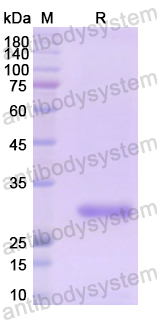Catalog No.
YHB91301
Expression system
E. coli
Species
Homo sapiens (Human)
Protein length
Thr497-Thr742
Predicted molecular weight
29.54 kDa
Nature
Recombinant
Endotoxin level
Please contact with the lab for this information.
Purity
>90% as determined by SDS-PAGE.
Accession
P01130
Applications
ELISA, Immunogen, SDS-PAGE, WB, Bioactivity testing in progress
Form
Lyophilized
Storage buffer
Lyophilized from a solution in PBS pH 7.4, 0.02% NLS, 1mM EDTA, 4% Trehalose, 1% Mannitol.
Reconstitution
Reconstitute in sterile water for a stock solution. A copy of datasheet will be provided with the products, please refer to it for details.
Shipping
In general, proteins are provided as lyophilized powder/frozen liquid. They are shipped out with dry ice/blue ice unless customers require otherwise.
Stability and Storage
Use a manual defrost freezer and avoid repeated freeze thaw cycles. Store at 2 to 8°C for frequent use. Store at -20 to -80°C for twelve months from the date of receipt.
Alternative Names
LDLR, Low-density lipoprotein receptor, LDL receptor
Fibrogenic Gene Signature as Early Prediction for the Efficacy of Pharmacological Interventions for MASH-Associated Fibrosis., PMID:40515541
LDL receptor-mediated endocytosis of Escherichia coli α-hemolysin mediates renal epithelial toxicity., PMID:40504153
Long-term experience with lomitapide treatment in patients with homozygous familial hypercholesterolemia: Over 10 years of efficacy and safety data., PMID:40494715
PCSK9 inhibition mitigates vulnerable plaque formation induced by hyperhomocysteinemia through regulating lipid metabolism and inflammation., PMID:40480522
Transcriptomics characteristics and differentiation of subcutaneous adipose tissue among Huainan pigs and its hybrid genetic populations., PMID:40475027
AAV8-LDLR Gene Therapy in Ldlr-KO and Homozygous Ldlr p.W483X Mice., PMID:40462752
A rare gain of function variant of hepatic lipase attenuates hypercholesterolemia and atherosclerosis in mice via an LDL receptor-independent mechanism., PMID:40460236
Cholesterol-induced colorectal cancer progression and its mitigation through gut microbiota remodeling and simvastatin treatment., PMID:40452015
Hypercholesterolemia Duration and Brain Area Determine Inflammatory Response Intensity and Apoptotic Mediator Activation in Apo E-/-/LDLR-/- Double-Knockout Mice., PMID:40445431
Exploring the pathways linking fasting insulin to coronary artery disease: a proteome-wide Mendelian randomization study., PMID:40442727
Functionalized Boron Carbide Nanoparticles as Active Boron Delivery Agents Dedicated to Boron Neutron Capture Therapy., PMID:40438187
Marein from Coreopsis tinctoria Nutt. alleviates oxidative stress and lipid accumulation via SIRT1/Nrf2 signaling., PMID:40437103
Anti-inflammatory, but not lipid-lowering, activity of hepatocyte PPARα improves atherosclerosis in Ldlr-deficient mice., PMID:40435217
Ertugliflozin attenuates atherosclerosis in nondiabetic ApoE-/- mice by upregulating ABCA1 and LDLR via the PPARγ/LXRα pathway., PMID:40419168
Integrating Mendelian randomization and multi-transcriptomic analyses to unveil the genetic association risk of regulatory T cell-mediated free cholesterol and gastric cancer., PMID:40405007
Strontium regulating lipid metabolism of bovine hepatocytes via SIRT1/SREBPs pathway., PMID:40403884
Structural basis for the recognition of two different types of receptors by Western equine encephalitis virus., PMID:40402741
Selected cell receptor genotypes differentially modulate the ABO blood group influence on Factor VIII levels in severe aortic stenosis., PMID:40398046
ASGR1 inhibitors, inflammation, and heart failure: A Mendelian randomization analysis., PMID:40391737
Structural dynamics of LDL receptor interactions with E498A and R499G variants of PCSK9., PMID:40388017
Negative Impact of Caloric Restriction on Atherosclerosis in Young ApoE/LDLr -/- Mice., PMID:40384342
Quantitative proteomic analysis of the protective effect exerted by alliin on ox-LDL-injured HUVECs., PMID:40379781
Asparagine endopeptidase cleaves apolipoprotein A1 and accelerates pathogenesis of atherosclerosis., PMID:40371638
IL-19 Is a Novel Lymphangiocrine Factor Inducing Lymphangiogenesis and Lymphatic Junctional Regulation., PMID:40371466
(-)-Oleuropein as a Novel Metastatic Castration-Resistant Prostate Cancer Progression and Recurrence Suppressor via Targeting PCSK9-LDLR Axis., PMID:40362754
Epigenetic Modifications in Alternative Splicing of LDLR pre-mRNA on Hypercholesterolemia Following Aerobic Exercise Training., PMID:40362496
Accelerated atherosclerosis associated with immune checkpoint inhibitors: a systematic review and meta-analysis of pre-clinical studies., PMID:40354680
Lanatoside C, a Novel Senolytic, Ameliorates Atherosclerosis in Mice., PMID:40354378
Design of lipid nanoparticle (LNP) containing genetic material CRISPR/Cas9 for familial hypercholesterolemia., PMID:40352243
[Clinical manifestations and genetic analysis of two patients with familial hypercholesterolemia caused by complex heterozygous variants]., PMID:40350401
The LDL receptor-related protein 1 (LRP1) facilitates ACE2-mediated endocytosis of SARS-CoV2 spike protein-containing pseudovirions., PMID:40349772
Decreased protein activator of interferon induced protein kinase (PRKRA) involved in menopause-related cholesterol metabolic disorders by regulating cholesterol biosynthesis., PMID:40349061
Resveratrol improved atherosclerosis by increasing LDLR levels via the EGFR-ERK1/2 signaling pathway., PMID:40340973
Homozygous familial hypercholesterolemia evaluation and survival single center study in Saudi Arabia: The HESSA registry., PMID:40339360
Kratom leaf extracts exert hypolipidaemic effects via the modulation of PCSK9 and LDLR pathways in HepG2 cells., PMID:40325086
Effect of dexamethasone on biological properties and metabolic adaptations of normal prostate epithelial cells under mild serum conditions., PMID:40316041
The role of gut microbiota on skeletal muscle strength in LDLR knockdown aging mice., PMID:40312444
Hypercholesterolemia drives microglial dysfunction and weakens response to amyloid plaques., PMID:40286863
Involvement of cholesterol and ketone bodies in early stages of bovine cystic ovarian disease development., PMID:40286443
A Novel Screening Approach for Familial Hypercholesterolemia: A Genetic Study on Patients Detected Using Preexisting Centralized Analytics., PMID:40283609
Gastrodin attenuates hypercholesterolaemia through regulating the PCSK9/LDLR signalling pathway by suppressing HNF-1α and activating FoxO3a., PMID:40279963
Fibroblast Activation Protein Compared with Other Markers of Activated Smooth Muscle Cells, Extracellular Matrix Turnover and Inflammation in a Mouse Model of Atherosclerosis., PMID:40278373
Attenuation of Atherosclerosis With PAR4 Deficiency: A Potential Role of Hematopoietically Expressed PAR4 in Atherosclerosis-Brief Report., PMID:40270259
Hepatoprotective and Antiatherosclerotic Effects of Oleoylethanolamide-Based Dietary Supplement in Dietary-Induced Obesity in Mice., PMID:40265441
Macrophage caspase-8 inhibition accelerates necrotic core expansion in atheroma plaque in mice., PMID:40264785
Variants in candidate genes and their interactions with smoking on the risk of acute coronary syndrome., PMID:40257950
Amelioration of atherosclerotic complications and dyslipidemia by verbascoside-enriched fraction of Clerodendrum glandulosum leaves targeting LDL-R and LXR-mediated reverse cholesterol transport., PMID:40256711
An Updated Review of Potential Drug Targets for Japanese Encephalitis., PMID:40247803
LDLR-targeted orlistat therapeutic nanoparticles: Peptide selection, assembly, characterization, and cell-uptake in breast cancer cell lines., PMID:40239877
Sesamin regulates breast cancer through reprogramming of lipid metabolism., PMID:40233124

